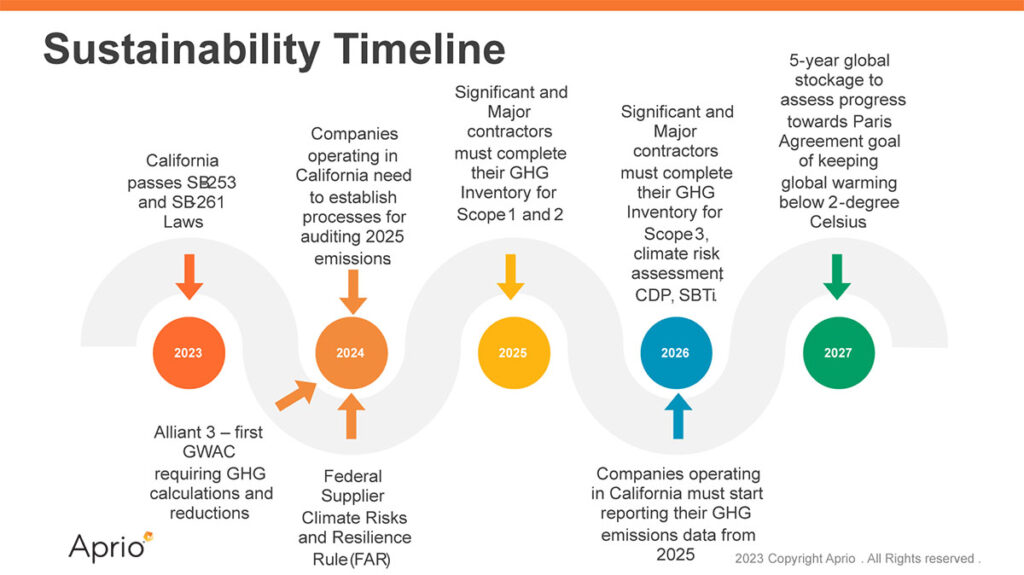Federal Policies on Sustainability for Government Contractors: Part 1
May 16, 2024
At a glance
- Main takeaway: The federal government is sending a strong message to government contractors that it will continue to place a greater emphasis on sustainability regulations.
- Impact on your business: Government contractors must effectively demonstrate their sustainability efforts if they want to remain competitive and secure government contracts.
- Next steps: Aprio’s Sustainability Advisory Practice can help your company calculate Greenhouse Gas (GHG) emissions across Scopes 1, 2, and 3 (direct emissions, purchased energy, and supply chain emissions).
Let Aprio get you started on your sustainability journey. Contact our team for a complimentary consultation.
The full story:
The federal government continues to take steps to align its environmental goals with those of the rest of the world, especially the ones adopted by the Paris Agreement and the UN Sustainable Development Goals.
One way the government is evolving the regulatory sustainability landscape is with the Federal Supplier Climate Risks and Resilience Rule. This proposed rule would require major and significant contractors to publicly disclose their greenhouse gas (GHG) emissions, climate-related financial risks, and set science-based emissions reduction targets.
Specifically targeting major (>$50M) and significant (>$7.5M – $50M) contractors, the rule will approximately cover 85% of the emissions associated with the federal supply chain. While the ruling was proposed in November of 2022, it is estimated to be enacted in late 2024 or early 2025. A year after the rule goes into effect, any significant and major contractors would be mandated to disclose their annual Scope 1 and 2 emissions from their most recent inventory. Two years after the enactment, contractors will be mandated to disclose their Scope 3 emissions.
Additionally, some states are taking their own leaps into sustainability regulation. For example, California has released two new climate laws that mark a significant shift in climate regulation, and reporting will begin in 2026.
- SB-253 Climate Corporate Data Accountability Act (CCDAA) requires public disclosure of GHG emissions (Scopes 1, 2, and 3) from companies with annual revenue over $1 billion.
- SB-261 Climate-Related Financial Risk Act (CRFRA) requires U.S. businesses with at least $500 million in revenue to disclose climate-related financial risks.

Integration of sustainability into procurement
To achieve the ambitious goal of integrating sustainability procurement into the government’s policies, a robust regulation framework is actively being built, from executive orders and agency-level initiatives to changes in RFPs, contract requirements, and metrics and tracking. Government agencies are developing concrete sustainability plans based on these initiatives with measurable targets that translate directly into procurement opportunities to help government contractors achieve their sustainability goals.
For example, since 2020, the Department of Energy (DOE) has invested $1.2 trillion into building energy efficiency, such as low-carbon electric vehicles. Meanwhile, the General Services Administration (GSA) continues to track federally awarded funding of companies who have taken proactive steps toward sustainability. In 2021, the GSA tracked:
- 54% of funding to contractors who publicly disclosed sustainability data through the Carbon Disclosure Project (CDP). The CDP maintains the world’s largest database on corporate climate actions, and the GSA encourages contractors to use CDP.
- 60% of funding to contractors who not only calculated their GHG emissions, but also disclosed the results via a public GHG inventory.
- 57% of funding to contractors who publicly disclosed their GHG emissions reduction targets.
- 20% of funding to contractors who have a clearly defined path to achieve the science-based targets initiative (SBTi) to reduce emissions in line with the Paris Agreement.
This upward trend of federal funding for adopting sustainability is a major opportunity for government contractors to gain a competitive edge and secure lucrative contracts. While this signifies an influx of funding into sustainability projects, the caveat is that contractors need to demonstrate their own commitment to sustainability with data-driven evidence from GHG calculations to ISO 14001 certifications, the internationally recognized standard for environmental management systems (EMS).
Federal Sustainability Plan
Climate-related damages have cost the government $750 billion between the years 2016 and 2021. So, to tackle the ever-present climate crisis, the government created the Federal Sustainability Plan with the ambitious goal of accomplishing net-zero emissions from procurement and overall operations by 2050. The Federal Sustainability Plan was based off the following executive orders:
- Executive Order 14057 – Catalyzing Clean Energy Industries and Jobs: The backbone of the sustainability plan and directs agencies to implement stringent climate regulation in federal operations and procurement.
- Executive Order 14008 – Tackling the Climate Crisis at Home and Abroad: There are two key sections in this executive order — Section 204 promotes increased contractor attention on reducing carbon emissions, and Section 205 focuses on achieving carbon pollution free electricity no later than 2035.
- Executive Order 14030 – Climate-Related Financial Risk: Stresses the need to prefer bids and proposals from suppliers with a lower social cost of GHG emissions, when appropriate and feasible.
Federal acquisition regulations
The U.S. is the largest global purchaser of goods and services; therefore, it plays a significant role in shaping markets. The Federal Sustainability Plan utilizes the Federal Acquisition Regulations (FAR) to establish sustainable procurement strategies through multiple award schedules. There are four climate-related FAR clauses that government contractors must be aware of:
- Public Disclosure of GHG Emissions and Reduction Goals FAR 52.223-22
- Energy Efficiency in Energy Consumption Products FAR 52.223-15
- Sustainable Acquisitions FAR 23.103
- Ozone Depleting Substances and Greenhouse Gasses FAR 23.8
Currently, the FAR Council is developing guidelines for sustainable procurement practices, including the use of environmental product declarations and the evaluation of supplier sustainability performance. In addition, the government is proposing a change to federal procurement rules to minimize the risk of climate change in procurement decisions, such as the ability to supply low carbon and sustainable goods.
The bottom line
Based on increasing mentions on sustainability requirements, the government is sending a strong message that they will continue to put a greater emphasis on GHG emissions disclosures and other climate-related assessments. Government contractors should anticipate a future where being able to effectively demonstrate sustainability efforts will become more prevalent in future contracts.
Becoming an early adopter in sustainability will help you gain a competitive edge to secure government contacts. Discover how Aprio’s Sustainability Advisory Practice helps government contractors calculate GHG emissions across Scopes 1, 2, and 3.
Stay tuned for part 2 of Federal Policies on Sustainability for Government Contractors.
Related Resources/Assets/Aprio.com articles/pages
The Road to Sustainability – Episode 1 – Greenhouse Gas Emissions
The Road to Sustainability – Episode 2 – What is the Federal Sustainability Plan?
The Road to Sustainability – Episode 4 – The Federal Supplier Climate Risks and Resilience Rule
Alliant 3: The first GWAC to require Greenhouse Gas (GHG) Emissions Reporting and Reduction Targets
About Aprio’s Sustainability Practice
Let Aprio get you started on your sustainability journey. Contact our team for a complimentary consultation.
Recent Articles
About the Author
Gabriela Brown
Sustainability Practice Leader Gabriela Brown is passionate about educating clients on the essential and valuable role ESG principles play in building sustainable business strategies. From design to implementation, she develops thoughtfully tailored ESG solutions for companies of all sizes operating in a variety of industries, including government contracting. As a champion of Aprio’s ESG Advisory Services team, Gabriela is dedicated to helping clients succeed every stage of their sustainability journey.
Pilar Diaz
Pilar is passionate about helping government contractors begin or enhance their sustainability journey. She applies her knowledge of sustainability frameworks, greenhouse gas, and corporate sustainability to help clients gain the tools and processes needed to accurately measure and report their carbon footprint. As contractors face increasing challenges related to climate change, Pilar helps them navigate new global initiatives and comply with regulations that support a more sustainable economic model.
Stay informed with Aprio.
Get industry news and leading insights delivered straight to your inbox.


